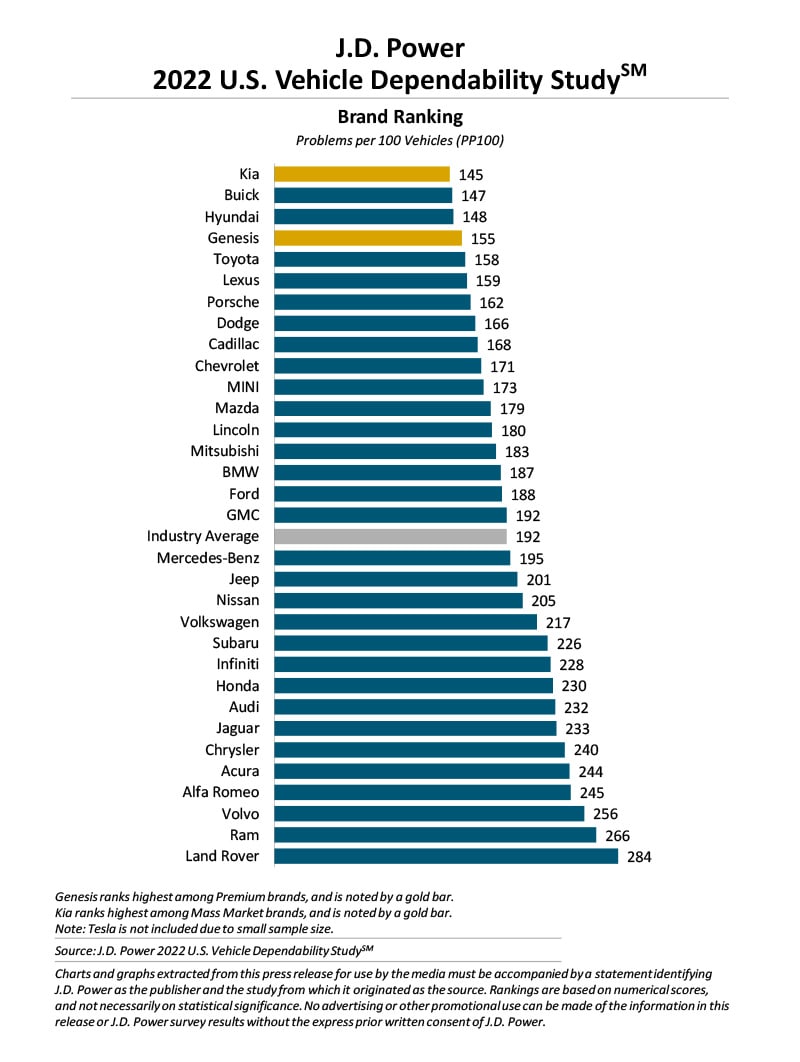For the first year ever, Kia leads J.D. Power’s annual Vehicle Dependability Study with a score of 145 problems per 100 vehicles. Buick (147) and Hyundai (148) round out the top three. The highest premium brand on the list is Genesis, with a score of 148. It’s common for so-called “mass market” brands to lead this particular study, according to J.D. Power, as “premium” brands “typically incorporate more technology in their vehicles, which increases the likelihood for problems to occur” and aren’t necessarily built to a higher standard that less-expensive brands.
The highest-rated single nameplate is the Porsche 911. It’s the third time out of the past four years and the second year in a row that Porsche’s quintessential sports car has taken top honors. Porsche as a brand sits in seventh place (162) just behind Lexus (159) and ahead of Dodge (166).
At the very bottom of the list is Land Rover with a dismal score of 284; the SUV specialist held the same unfortunate distinction on last year’s list. Ram (266), Volvo (256), Alfa Romeo (245) and Acura (244) also performed poorly. The overall industry average score sits at 192 — mass market brands average a score of 190 while premium brands sit 14 points lower at 204. While Tesla is unofficially included in some of J.D. Power’s results, the agency says the sample size it has access to for this study is too small to include.
As has been the case for the past several years, infotainment systems dominate the list of problems reported by owners. Popular (or unpopular, depending on your point of view) complaints include built-in voice recognition (8.3 PP100), Android Auto/Apple CarPlay connectivity (5.4 PP100), built-in Bluetooth system (4.5 PP100), not enough power plugs/USB ports (4.2 PP100), navigation systems difficult to understand/use (3.7 PP100), touchscreen/display screen (3.6 PP100), and navigation system inaccurate/outdated map (3.6 PP100).
While problems with the car’s infotainment and technology packages are indeed bothersome, it’s important to remember that such issues aren’t usually leaving owners stranded with an immovable vehicle like a broken transmission or blown engine would. Culling infotainment complaints from the results would reduce the average problem-per-100-vehicle score by a staggering 51.9 points.
The vehicles included in this study are from the 2019 model year. That means owners have had three years to get to know their cars and trucks. It’s the 33rd year that J.D. Power has surveyed owners regarding dependability, but the study has evolved with the times. It was redesigned for this year to include “184 specific problems areas across nine major vehicle categories.” For 2022, these categories include driving assistance technologies for the first time. You’ll notice that this year’s scores are dramatically different from last year’s, reflecting the change in the study’s format.
“Automakers are increasingly looking at owners’ relationships with their vehicles as having similarities to other consumer technology,” David Amodeo, director of global automotive at J.D. Power, said in a statement. “For instance, cellphones update all the time with over-the-air software releases and, increasingly, automakers must take advantage of this approach to fix problems, improve features and add capabilities to keep owners satisfied. Automakers that are able to do this best will have a huge advantage.”
Individual models earning top honors in their segments:
Related video:
Source: www.autoblog.com

